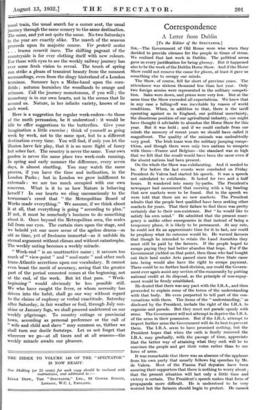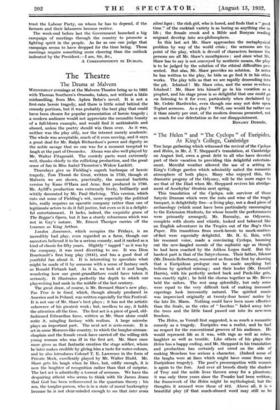Correspondence
A Letter from Dublin
[To the Editor of the SPEcreeroa.1 Snt,—The Government of Old Rome were wise when they decided to provide circuses for the people in times of stress. We realized that last week in Dublin. The political arena gave us every justification for being gloomy. But it happened also to be the week of the Dublin Horse Show. And if the Horse Show could not remove the cause for gloom, at least it gave us something else to occupy our minds.
The Show, of course, fell far short of previous years. The attendance was sixteen thousand less than last year. Only two foreign armies were represented in the military competi- tion. Sales were down, and prices were very low. But at the same time the Show exceeded all expectations. We knew that in any case a falling-off was inevitable by reason of world conditions. When, in addition to that, there is the tariff operating against us in England, our political uncertainty, the disastrous position of our agricultural industry, one might have thought it advisable to abandon the Horse Show for this year. But it was held ; and if we could exclude from our minds the memory of recent years we should have called it magnificent. The quality of the animals was undoubtedly very good. The Irish team won the military jumping compe- tition, and though there were only two nations to compete with them—France and Belgium—the standard was so high that we felt that the result• would have been the same even if the absent nations had been present.
On the whole the Show was exhilarating. And it needed to be. For before the last events were concluded on Friday President de Valera had started his speech. It was a speech not calculated to exhilarate. It lasted for two and a half hours. It wandered into many by-paths. The President's newspaper had announced that morning with a big heading that new markets were to be found. But in the speech we were told that there are no new markets. The President admits that the people best qualified have been seeking other markets for years. That their failure to find them was pretty certainly due to their non-existence. But " he would like to satisfy his own mind." He admitted that the present emer- gency is unlike other emergencies in that instead of being a temporary phase, it is likely to be permanent. At any rate, he could not fix an approximate time for it to last, nor could he prophesy what its outcome would be. He warned farmers that though he intended to retain the Land Annuities they must still be paid by the farmers. If the people hoped to escape paying they had better abandon that hope. For if the Government yielded on that point, then those who had bought out their land under Acts passed since the Free State came into being would also have the right to escape payment. There could be no further land-division, nor could the Govern- ment ever again assist any section of the community by putting national credit at its disposal, as the principle of non-repay- ment would be firmly established.
He denied that there was any pact with the I.R.A., and then proceeded to explain some of the terms of the understanding with that body. He even purported to tell part of the con- versations with them. The items of the " understanding," as disclosed by the President, include the right of the I.R.A. to organize and parade. But they must not parade openly with arms. The Government will not attempt to deprive the I.R.A. of the arms in their possession. But if the I.R.A. attempt to import further arms the Government will do its best to prevent them. The I.R.A. seem to have promised nothing, but the President hopes that when the oath is finally removed the I.R.A. may gradually, with the passage of time, appreciate that the better way of attaining what they seek will be to convince the people and get their votes rather than to use force of arms.
It was remarkable that there was an absence of the applause from his own party that usually follows big speeches by Mr. de Valera. Most of the Fianna Fail deputies have been assuring their supporters that there is nothing to worry about ; that the present situation will last only a little time and victory is certain. The President's speech makes that form of propaganda more difficult. He is understood to be very worried lest the farmers should begin to protest. He cannot trust the Labour Party, on whom he has to depend, if the farmers and their labourers become restive.
The week-end before last the Government launched a big campaign of meetings through the country to promote a fighting spirit in the people. As far as one can judge that campaign seems to have dropped for the time being. Those meetings require something more cheering than the outlook indicated by the President.—I am, Sir, &c., A CORRESPONDENT IN DUBLIN.































 Previous page
Previous page